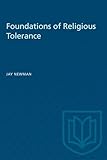Foundations of Religious Tolerance / Jay Newman.
Material type: TextSeries: HeritagePublisher: Toronto : University of Toronto Press, [1982]Copyright date: ©1982Description: 1 online resource (192 p.)Content type:
TextSeries: HeritagePublisher: Toronto : University of Toronto Press, [1982]Copyright date: ©1982Description: 1 online resource (192 p.)Content type: - 9780802065070
- 9781487577759
- 261.7/2 19
- BR1610 .N48 1982eb
- online - DeGruyter
| Item type | Current library | Call number | URL | Status | Notes | Barcode | |
|---|---|---|---|---|---|---|---|
 eBook
eBook
|
Biblioteca "Angelicum" Pont. Univ. S.Tommaso d'Aquino Nuvola online | online - DeGruyter (Browse shelf(Opens below)) | Online access | Not for loan (Accesso limitato) | Accesso per gli utenti autorizzati / Access for authorized users | (dgr)9781487577759 |
Browsing Biblioteca "Angelicum" Pont. Univ. S.Tommaso d'Aquino shelves, Shelving location: Nuvola online Close shelf browser (Hides shelf browser)

|

|

|

|

|

|

|
||
| online - DeGruyter The Poetical Works of Alexander McLachlan / | online - DeGruyter Goethe's Poetry for Occasions / | online - DeGruyter Current Law and Social Problems, Volume III / | online - DeGruyter Foundations of Religious Tolerance / | online - DeGruyter Allusion : A Literary Graft / | online - DeGruyter Aids as an Apocalyptic Metaphor in North America / | online - DeGruyter The Beginnings of the Book Trade in Canada / |
restricted access online access with authorization star
http://purl.org/coar/access_right/c_16ec
Religious intolerance is very old and widespread - a phenomenon of a highly distinctive nature which defies reduction to a simpler kind of vice. Methods of achieving religious tolerance have long been in dispute because there is much confusion about its nature.In this book, Professor Newman attempts to clarify the concept of religious tolerance in a way that other recent philosophical studies have clarified such concepts as justice, freedom, and equality. While there is a great deal of literature on theological, psychological, sociological, and political aspects of the problem, little has been said about the more fundamental ethical and epistemological issues that arise from philosophical reflection on religious competition and conflict.Newman addresses such questions as: How does religious intolerance differ from religious prejudice? Does being tolerant require commitment to relativism, pluralism, secularism, or universalism? Can a State live up to its promise to allow its citizens freedom of religion? Is intolerance a vice or a deep-rooted psychosis? Is it an inevitable by-product of education socialization? In shedding light on these and related problems, offering tentative solutions, and drawing on the writings of such philosophers as Aristotle, Aquinas, Spinoza, and Hume and such modern thinkers as Gordon Allport, Ronald Knox, and Walter Lippmann, Foundations of Religious Tolerance will assist clergymen, scholars, and laymen in their attempts to promote social harmony and mutual understanding among people of different faiths.This book will be especially useful in university courses and other programs in religious studies, philosophy, psychology, and sociology of religion, or that deal with prejudice and discrimination.
Mode of access: Internet via World Wide Web.
In English.
Description based on online resource; title from PDF title page (publisher's Web site, viewed 01. Nov 2023)


